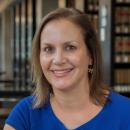FCJC Honored for Groundbreaking Stash House Cases Litigation
Above: watch as Siegler, Zunkel, Miller, a former student, and a former client discuss the case and its impact.
The Law School’s Federal Criminal Justice Clinic was honored last night by the Clinical Legal Education Association for its groundbreaking fake stash house litigation, which exposed racial discrimination in an entire category of federal cases. The multi-year project challenged the practice by the federal Bureau of Alcohol, Tobacco, Firearms, and Explosives of luring unsuspecting people of color into schemes to rob non-existent drug stash houses. The project began with appellate litigation that created a new legal standard that has been adopted by courts of appeals across the country.
“The FCJC’s appellate litigation dramatically improved the legal standard for people seeking discovery about race discrimination by police, ushering in a new wave of litigation challenging racial bias,” the organization said in announcing the 2020 CLEA Award for Excellence in a Public Interest Case or Project.
The clinic then launched a years-long battle in district court, coordinating litigation with attorneys with similar cases and using statistical evidence to save their 43 clients from hundreds of years in prison. Their litigation culminated in a massive consolidated evidentiary hearing involving 12 cases, nine different federal district court judges, and dueling expert testimony, colleagues from across the country described in their nomination letter.
“The project exemplifies individual client representation as a vehicle for systemic change,” CLEA wrote. “The FCJC’s litigation strategy was so successful that lawyers elsewhere adopted it to change the law in other circuits, and it promises to produce just outcomes for hundreds of people unfairly targeted and incarcerated nationwide.”
Scores of clinic students worked on the cases, devoting thousands of hours to writing motions and briefs, meeting with clients, litigating for release on bond, and arguing in court in sentencing hearings. The project, which began in 2014, was led by Clinical Professor and FCJC Director Alison Siegler as well as Associate Clinical Professor and Associate Director Erica Zunkel and Associate Clinical Professor Judith Miller. The FCJC, which was founded in 2008 by Siegler and is part of the Law School’s Edwin F. Mandel Legal Aid Clinic, is the nation’s first legal clinic devoted solely to representing indigent defendants charged with federal felonies.
“It was an extraordinary honor to work alongside Professor Erica Zunkel, Professor Judith Miller, and the many, many students whose brilliance, energy, and dedication powered this fight,” Siegler said. “There were some devastating losses along the way, but we ultimately won the war.”
Former FCJC students supported the nomination, detailing the thousands of hours they’d devoted to the project, adding: “Professor Siegler’s vision and strategic brilliance forged the path…, but it was her enormous dedication to her students and sharp pedagogical insight that ensured we were part of the team at every step.”
Read more about the new legal standard created by the stash house litigation in this Northwestern University Law Review article by Alison Siegler and William Admussen, Discovering Racial Discrimination by the Police (forthcoming 2020).


